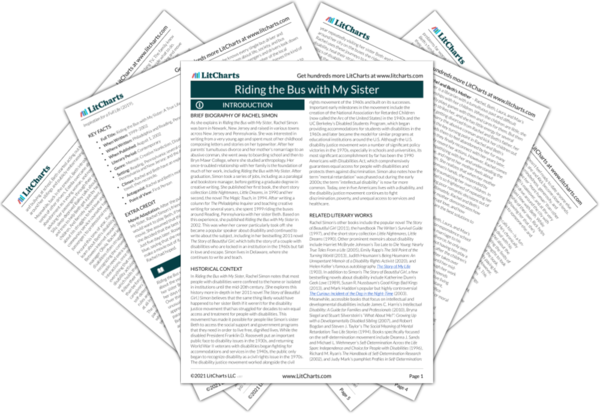Rachel and Beth’s Father Quotes in Riding the Bus with My Sister
Mommy sits Max and Laura and me down in her room and closes the door. She tells us, “Beth needs a little extra help sometimes, and whenever you see that she does, help her. Don’t you ever forget: it could have happened to any one of you.”
[…]
Daddy says, “Some people send mentally retarded kids away to institutions, but we’ll never do that. Ever, ever, ever. We’ll always have room for her.”
Then when they get up and open the doors I think about how we just heard two words that they never say in front of Beth: “mentally retarded.” We never ask why, we just go back to playing with her. But we know, too, not to say those words where she can hear them.
Dad realizes they are lost.
“I don’t know where we are,” he admits, squinting through the blackness.
“Will we get home?” Beth asks.
“Somehow. I’ll get us there somehow.”
She’s quiet for a minute, then she looks at him. “At least we have each other,” she says.
She goes on and on, and now the dark voice, which I thought I’d laid to rest last month, roars within me again. I squeeze my hands together. When I started riding the buses, I remember, I thought of the people who didn’t like Beth as insensitive and narrow-minded. Now I find myself more sympathetic to their point of view. Yes, some of them are coarse and offensively vocal. But she is so loud. And she talks all the time. About nothing. I know many of us babble on about nothing, too, but she does it over and over and over—and over and over and over—and it’s really eroding the limits of my endurance. Dad used to tell us he came to dread their car rides to work for precisely the same reasons. That was twenty years ago.

Rachel and Beth’s Father Quotes in Riding the Bus with My Sister
Mommy sits Max and Laura and me down in her room and closes the door. She tells us, “Beth needs a little extra help sometimes, and whenever you see that she does, help her. Don’t you ever forget: it could have happened to any one of you.”
[…]
Daddy says, “Some people send mentally retarded kids away to institutions, but we’ll never do that. Ever, ever, ever. We’ll always have room for her.”
Then when they get up and open the doors I think about how we just heard two words that they never say in front of Beth: “mentally retarded.” We never ask why, we just go back to playing with her. But we know, too, not to say those words where she can hear them.
Dad realizes they are lost.
“I don’t know where we are,” he admits, squinting through the blackness.
“Will we get home?” Beth asks.
“Somehow. I’ll get us there somehow.”
She’s quiet for a minute, then she looks at him. “At least we have each other,” she says.
She goes on and on, and now the dark voice, which I thought I’d laid to rest last month, roars within me again. I squeeze my hands together. When I started riding the buses, I remember, I thought of the people who didn’t like Beth as insensitive and narrow-minded. Now I find myself more sympathetic to their point of view. Yes, some of them are coarse and offensively vocal. But she is so loud. And she talks all the time. About nothing. I know many of us babble on about nothing, too, but she does it over and over and over—and over and over and over—and it’s really eroding the limits of my endurance. Dad used to tell us he came to dread their car rides to work for precisely the same reasons. That was twenty years ago.











